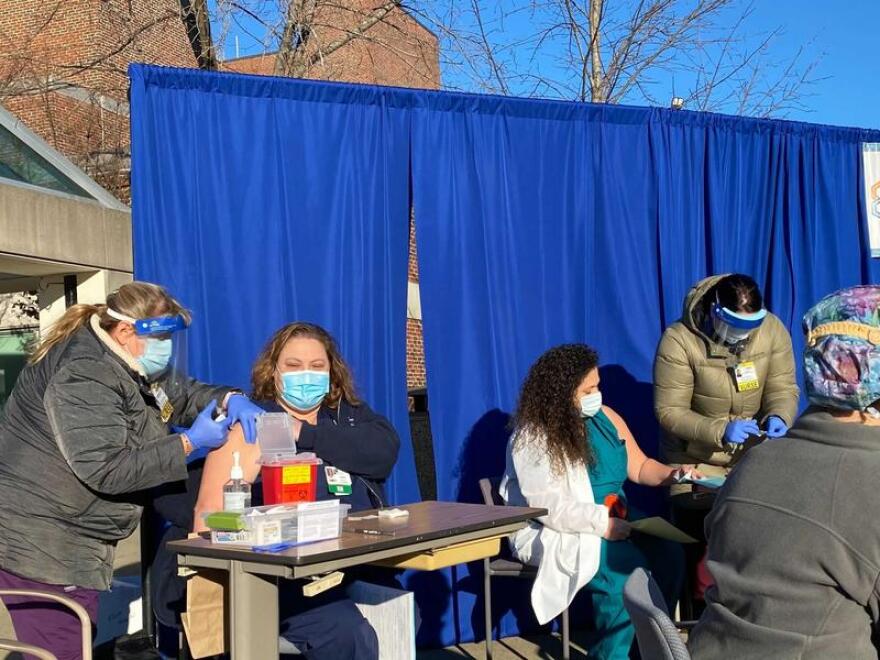After Memorial Day, New Hampshire's large state-run vaccination sites will stop administering the COVID-19 vaccine as those state-run sites phase out. Vaccine administration is shifting further into traditional health care settings like primary care providers.
All Things Considered Host Peter Biello spoke with NHPR's Health & Equity Reporter Alli Fam to talk about how that transition is going.
Get the latest N.H. news on COVID-19: Sign up for NHPR's coronavirus newsletter
Peter Biello: Are people just going to be able to walk into their doctor's office and get the COVID-19 vaccine like they would the flu shot or any other vaccine?
Alli Fam: Yeah, so that's definitely the ultimate goal here. And it's a key strategy for getting people who aren't yet vaccinated to get their shots. I mean, experts have said that when a person has a trusted relationship with their doctor or medical provider and when they're in a place where they're used to getting vaccine shots, that is a doctor's office, that can be key in reaching folks who, for whatever reason, haven't gotten vaccinated so far. But as it turns out, bring the covered vaccine into doctors' offices is actually a lot more complicated than the flu shot. I spoke with Dr. Keith Stahl and he's the associate chief medical officer at Catholic Medical Center, or CMC in Manchester, and he's been working on that transition for their primary care providers.
Doctor Stahl: There's nuances to the COVID vaccines that are very different from the vaccines we're used to giving. You've got the storage issues which have to be contended with, the fact that they come in multi-dose vials and we don't want to waste a single drop.
Alli Fam: So once you open a vial, the time is really ticking. And if you're just doing a person here or there or you don't even know how many people are going to come, there's really a fear that all those doses might not get used up. So the state has said that right now providers can balance the desire to limit that wastage with taking every opportunity they have to vaccinate someone. But I mean, that's a really tricky balance, right? Because while sure supply in New Hampshire is outpacing demand, I think providers are very, very aware that globally this vaccine isn't reaching everyone and that really is weighing on them. I think everyone I spoke to is really looking forward to the day when the COVID vaccine is like the flu shot comes in single dose vials. Maybe the storage isn't so complicated, but that day is not here yet.
Peter Biello: Right. Right. So so they'd more easily be able to do walk ins without worrying about wasting the vaccine?
Alli Fam: Exactly. Exactly. And all of those logistical challenges, at least for Dr. Stahl, his team at CMC, they've decided that what makes the most sense is to have one site where all patients in their network can book an appointment and then come to get vaccinated.
Peter Biello: That actually sounds a lot like a mini version of what the state's been doing for months, right?
Alli Fam: Yeah, and that's that's exactly actually how Dr. Stahl described it to me. He called them mini clinics and he says they're planning to have around 30 to 50 people or so come to these.
Peter Biello: 30 to 50 people is obviously a lot less than the state sites are seeing, but it's sizable. What about smaller, doctors offices that maybe aren't affiliated with the hospital?
Alli Fam: Yeah, that's a really good question. And right now, at least, the state says that it's prioritizing larger practices with a higher patient volume, exactly like CMC, where Dr. Stahl is. And, you know, for these larger practices, their primary care providers are often connected to a hospital system. And that means more resources. It means it's easier for them to access the fancy fridges they need for storage. It means that they might have staff to dedicate to a planning team for this transition and staff clinics. But, you know, that is definitely not the case for smaller providers. I spoke to Dr. Marie-Elizabeth Ramas, and she's the medical director at Gatehouse Treatment Center in Nashua. And they provide primary care, among other services, for folks who suffer from substance use disorders. And for them, when she told me is:
Doctor Ramas: It doesn't make sense for us with our limited staff to supply the vaccine on site. Our clinics, you know, have a limited amount of bandwidth. And we're balancing that with we're trying to get other things done.
Alli Fam: And so she's trying to work with the health department in the region to make sure that there's other options for her patients to get the vaccine. And there are other ways for people to get the vaccine. Still, that includes pharmacies, hospitals and regional clinics. And those can be at schools, food pantries and other community spaces where local health centers have been working to get the vaccines to harder to reach groups.
Peter Biello: Yes, but I imagine for many people, the convenience of getting a vaccine on the spot in their doctor's office, maybe their best option.
Alli Fam: Yes, that's exactly what Dr. Ramas and other providers I spoke to said. They do really see a loss in not being able to offer it on the spot. You know they want to seize the moment. If someone was a little unsure and now they're feeling like, hey, I can get it, they don't want to miss that opportunity. Or if it's tricky for someone to book a separate appointment to get the vaccine elsewhere, then they want to be able to to make it convenient.








